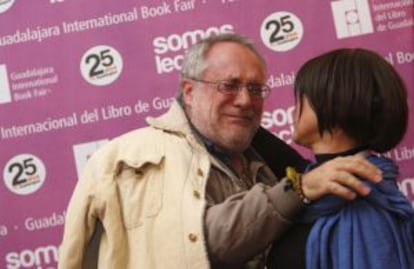Mexico peace movement on the march
Anti-crime group calls for policy changes as activist's killing sparks outrage
The murder this week of Nepomuceno Moreno, who had publically accused Mexican police officers of kidnapping his teenage son last year, has fueled further anger about the government's inability to stop the spiral of drug-related violence in the country, which has left an estimated 40,000 people dead over the last five years.
On Monday Moreno was killed after being shot five times when he stopped his van at a streetlight in Hermosillo, the state capital of the border state of Sonora. Moreno, a sidewalk seafood vendor, became one of the most visible faces of the Movement for Peace with Justice and Dignity, set up by poet Javier Sicilia.
Accusing masked police of snatching his son and two other young men in July 2010, Moreno pleaded his case directly to President Felipe Calderón in October at a meeting organized by Sicilia's peace movement.
"We blame the authorities for the death of Nepomuceno, by omission, for not responding to his requests for protection," the Movement for Peace with Justice and Dignity said in a statement issued Tuesday.
The initiative was launched by Sicilia after his son, Juan Francisco, a university student, was killed on March 28 in the central city of Cuernavaca along with six other friends in what officials called a case of mistaken identity by drug-cartel members engaged in a war with other criminals.
Following a botched police investigation in which the authorities attempted to smear Sicilia's son, suggesting he might have had connections to the drugs trade, Sicilia decided to launch a national movement, which has since organized a series of increasingly high-profile marches and protests throughout the country.
In September, a 14-bus caravan set off from Mexico City spending 10 days traveling around the country. Its every move was followed by the national media, and thousands showed up to greet its return to the capital.
The movement is just one part of a larger awakening of civil society in Mexico, which can be seen in the strengthened investigative efforts of the press, a more aggressive application of anticorruption laws, and the formation of voluntary associations, focused on everything from the environment to poverty. Aside from its symbolic value, many observers point out that conflict-stricken societies can only take meaningful steps toward peace when ordinary people work together to overcome violence.
Sicilia, a left-wing Catholic, has clear ideas about how the government, which is widely seen as responsible for sparking the last five years of savagery, must change. Aside from the meeting with President Felipe Calderón, representatives of the poet's movement have met high-ranking members of the Senate and House of Deputies.
The Movement for Peace is calling on President Calderón to change his strategy against the drug cartels, one that goes beyond police and military power to include, for instance, a thorough investigation into the connections between politicians and criminals. It says some drugs will need to be legalized.
It has asked Congress to modify the proposed National Security Law, which proposes tougher action against the cartels but which the movement considers inadequate in terms of human rights. It also calls for the creation of a truth and reconciliation commission, similar to the one in Colombia that has helped identify victims and uncover police corruption; a national registry of the disappeared and detained; a program to halt the abuse of Central American migrants; and an independent auditor for the federal police, which it believes cannot be adequately monitored from within the government.
Calderón has listened attentively, but he has yet to change his positions.
Mexico's congressional leaders have been more positive, supporting nearly all the proposals. Analysts say their response is largely because of national elections next year. While the movement has no plans to enter electoral politics, Sicilia and others make no secret of their intentions to influence voters.

Tu suscripción se está usando en otro dispositivo
¿Quieres añadir otro usuario a tu suscripción?
Si continúas leyendo en este dispositivo, no se podrá leer en el otro.
FlechaTu suscripción se está usando en otro dispositivo y solo puedes acceder a EL PAÍS desde un dispositivo a la vez.
Si quieres compartir tu cuenta, cambia tu suscripción a la modalidad Premium, así podrás añadir otro usuario. Cada uno accederá con su propia cuenta de email, lo que os permitirá personalizar vuestra experiencia en EL PAÍS.
¿Tienes una suscripción de empresa? Accede aquí para contratar más cuentas.
En el caso de no saber quién está usando tu cuenta, te recomendamos cambiar tu contraseña aquí.
Si decides continuar compartiendo tu cuenta, este mensaje se mostrará en tu dispositivo y en el de la otra persona que está usando tu cuenta de forma indefinida, afectando a tu experiencia de lectura. Puedes consultar aquí los términos y condiciones de la suscripción digital.








































